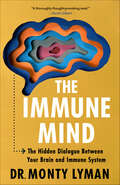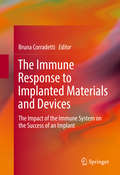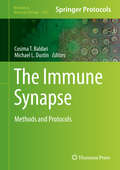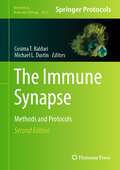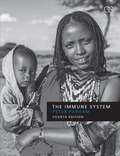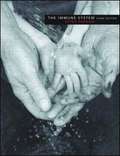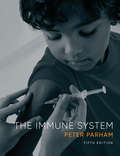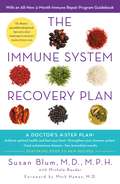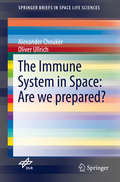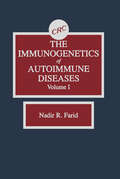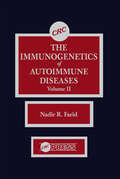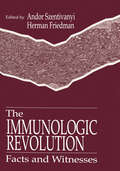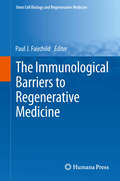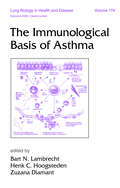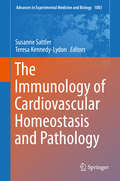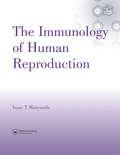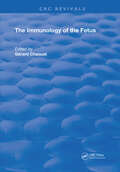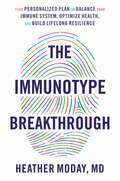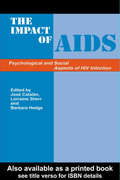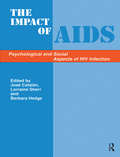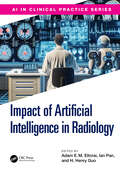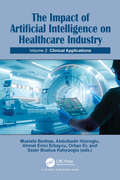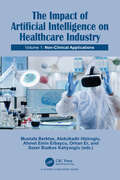- Table View
- List View
The Immune Mind: The Hidden Dialogue Between Your Brain and Immune System
by Monty LymanDelving into the recent discovery of the brain's immune system, Dr. Monty Lyman reveals the extraordinary implications for our physical and mental health.Until a decade ago, we misunderstood a fundamental aspect of human health. Although the brain and the body have always been viewed as separate entities—treated in separate hospitals—science now shows that they are intimately linked.Startlingly, we now know that our immune system is in constant communication with our brain and can directly alter our mental health. This has opened up a new frontier in medicine. Could inflammation cause depression, and could arthritis drugs cure it? Can gut microbes alter your mood? Can something as simple as brushing your teeth properly reduce your risk of dementia? Could childhood infections lie behind neurological and psychiatric disorders such as tics and obsessive compulsive disorder?In The Immune Mind, Dr. Monty Lyman explores the fascinating connection between the mind, immune system, and microbiome. A specialist in the cutting-edge field of immuno-psychiatry, Lyman argues that we need to change the way we treat disease and the way we see ourselves. For the first time, we have a new approach to medicine that treats the whole human being.
The Immune Response to Implanted Materials and Devices
by Bruna CorradettiThis book provides a comprehensive overview of the cascade of events activated in the body following the implant of biomaterials and devices. It is one of the first books to shed light on the role of the host immune response on therapeutic efficacy, and reviews the state-of-the-art for both basic science and medical applications. The text examines advantages and disadvantages of the use of synthetic versus natural biomaterials. Particular emphasis is placed on the role of biomimicry in the development of smart strategies able to modulate infiltrating immune cells, thus reducing side effects (such as acute and chronic inflammation, fibrosis and/or implant rejection) and improving the therapeutic outcome (healing, tissue restoration). Current cutting-edge approaches in tissue engineering, regenerative medicine, and nanomedicine offer the latest insights into the role immunomodulation in improving tolerance during tissue transplant in the treatment of orthopaedic, pancreatic, and hepatic diseases. "Immune Response to Implanted Materials and Devices" is intended for an audience of graduate students and professional researchers in both academia and industry interested in the development of smart strategies, which are able to exploit the self-healing properties of the body and achieve functional tissue restoration.
The Immune Synapse
by Cosima T. Baldari Michael L. DustinThis volume provides all the essential protocols that are currently used to study the immune synapse. Chapters in The Immune Synapse: Methods and Protocols cover methods for the study of the dynamics of immune synapse assembly, traffic at the immune synapse, new high resolution imaging, biophysical and computational methods for the study of the immune synapse, effector immune synapses, B cell, NK and mast cell immune synapses, and immune interactions in vivo. Written in the highly successful Methods in Molecular Biology series format, chapters include introductions to their respective topics, lists of the necessary materials and reagents, step-by-step, readily reproducible laboratory protocols, and tips on troubleshooting and avoiding known pitfalls. Authoritative and practical, The Immune Synapse: Methods and Protocols will be of interest to immunologists and, at a more general level, to cell biologists, biophysicists and computational biologists.
The Immune Synapse: Methods and Protocols (Methods in Molecular Biology #2654)
by Cosima T. Baldari Michael L. DustinThis new collection features the most up-to-date essential protocols that are currently being used to study the immune synapse. Beginning with methods for making biophysical measurements, the volume continues by covering the cell biology of synapses, methods for advanced substrate engineering, mechanobiology topics, new technologies to describe and manipulate synaptic components, as well as methods related to sites of action and immunotherapy. Written for the highly successful Methods in Molecular Biology series, chapters include introductions to their respective topics, lists of the necessary materials and reagents, step-by-step and readily reproducible laboratory protocols, and tips on troubleshooting and avoiding known pitfalls. Authoritative and fully updated, The Immune Synapse: Methods and Protocols, Second Edition serves as an ideal practical guide for researchers working in this dynamic field. Chapters 5, 11, 18, 27, 30, and 32 are available open access under a Creative Commons Attribution 4.0 International License via link.springer.com.
The Immune System
by Peter ParhamThe Immune System, Fourth Edition emphasizes the human immune system and presents immunological concepts in a coherent, concise, and contemporary account of how the immune system works. Written for undergraduate, medical, veterinary, dental, and pharmacy students, it makes generous use of medical examples to illustrate points. This classroom-proven
The Immune System (3rd edition)
by Peter ParhamParham (structural biology, microbiology, immunology, Stanford U.) offers a third edition to his textbook explaining the functions of the human immune system. It is specifically intended for undergraduate students in medical, dental, and pharmacy in immunology courses. Extensively updated, the textbook includes new chapters on innate and adaptive immunity, enhanced treatment of aspects of innate immunity such as the complement system and defensins, immunotherapies, and the nature of immune response in mucosal tissues and immunological memory. It is well-illustrated and includes essay, multiple choice, and case study questions at the conclusion of each chapter. Annotation ©2009 Book News, Inc., Portland, OR (booknews.com)
The Immune System (Fifth Edition)
by Peter ParhamA thoroughly updated introduction to immunology. The Immune System is a concise yet thorough human-oriented introduction to how the human immune system works. It provides an up-to-date presentation of the field, written in an accessible style, replete with relevant medical examples. Plentiful illustrations and micrographs complement and illuminate the explanations. This purchase offers access to the digital ebook only.
The Immune System Recovery Plan: A Doctor's 4-Step Program to Treat Autoimmune Disease
by Dr Susan Blum M.D., M.P.H"The Immune System Recovery Plan is the right book, at the right time, by the right person. We are witnessing a significant increase in autoimmune inflammatory diseases, which include more than 80 different diagnoses. Dr. Blum has done a magnificent job helping the reader to understand how this family of inflammatory disorders, including arthritis and fibromyalgia, can be managed with the diet and lifestyle program she developed in her practice. Her step-by-step approach is based on her considerable years of experience as a physician, and the emerging medical science that, for the first time, has developed an understanding of how genetics, lifestyle and nutrition play a role in origin of these disorders. The approach described in Dr. Blum's book represents the leading edge in the lifestyle management of chronic inflammatory disorders. It is a 'news to use' book that provides real assistance to those with inflammatory disorders who are looking for a clinically sensible approach to their problems." (Jeffrey Bland, Ph.D., FACN, President, Personalized Lifestyle Medicine Institute)The innovative four-step method in this book focuses on:Using food as medicineUnderstanding the stress connectionHealing your gut and digestive systemOptimizing liver functionEach of these sections includes an interactive workbook to help you determine and create your own personal treatment program. Also included are recipes for simple, easy-to-prepare dishes to jump-start the healing process.The Immune System Recovery Plan is a revolutionary way for people to balance their immune systems, transform their health, and live fuller, happier lives.
The Immune System in Space: Are we prepared?
by Alexander Choukèr Oliver UllrichThis book gives insight into the mechanism of the immune system and the influence of the environment on earth. Further, the book explains the changes that occur in our immune system in the absence of gravity and their fundamental consequences. Several limiting factors for human health and performance in microgravity have been clearly identified as an unacceptable risk for long-term and interplanetary flights. Serious concerns arose whether spaceflight-associated immune system dysfunction ultimately precludes the expansion of human presence beyond Earth's orbit. The immune system has undergone many evolutionary steps to cope with a new and changing environment, but `space` has not been evolutionary experienced before. Through endocrine orchestration of cell functions, cell to cell communications and intracellular mechanisms the human body and his immune system have an enormous capacity to adapt and react to altered environmental conditions. Thus, the special sensitivity to altered gravity renders the immune system an ideal biological model system to understand if and how gravity on Earth is required for the normal function of cells and cellular networks. It is one of the most fundamental challenges to find out, if our organism and our cellular machinery are able to live and to adequately perform without the gravity field of Earth. The book is written for immunologists and researchers in human physiology under normal and stressfull conditions.
The Immunogenetics of Autoimmune Diseases, Volume I
by Nadir R. FaridMany developments in immunology have occurred over the past 10 years that give us a better understanding of the immune system and its dysfunctions. Refined mapping of the major histocompatibility complex MHC; elucidation of its gene structure and polymorphism, as well as the molecular basis of MHC restriction; the arrangement, expression, and regulation of immunoglobulins; definition of the structure of the T cell receptor and organization of its genes; and the characterization of soluble factors involved in cell/cell interactions and cloning of their genes are among the major accomplishments. Volumes I and II build on these developments in basic immunology to introduce animal models of various diseases, corresponding human studies, and the genetic analysis of autoimmune traits at the patient population level. The book will be a tremendous asset to immunologists, geneticists, and physicians in various areas of clinical subspecialties.
The Immunogenetics of Autoimmune Diseases, Volume II
by Nadir R. FaridMany developments in immunology have occurred over the past 10 years that give us a better understanding of the immune system and its dysfunctions. Refined mapping of the major histocompatibility complex MHC; elucidation of its gene structure and polymorphism, as well as the molecular basis of MHC restriction; the arrangement, expression, and regulation of immunoglobulins; definition of the structure of the T cell receptor and organization of its genes; and the characterization of soluble factors involved in cell/cell interactions and cloning of their genes are among the major accomplishments. Volumes I and II build on these developments in basic immunology to introduce animal models of various diseases, corresponding human studies, and the genetic analysis of autoimmune traits at the patient population level. The book will be a tremendous asset to immunologists, geneticists, and physicians in various areas of clinical subspecialties.
The Immunogenetics of Dermatologic Diseases (Advances in Experimental Medicine and Biology #1367)
by Nima Rezaei Fateme RajabiThis book intends to investigate the broad spectrum of genetic changes in immunological processes involved in cutaneous diseases. One of the main goals of immunogenetic studies is finding susceptibility genes for complex diseases. This can provide an insight into the pathogenesis of the condition in a way that is not easily achievable through other kinds of studies. Thus they are a rational initial step for generating hypotheses about disease pathogenesis. This may especially benefit dermatology, a field notorious for having too many diseases with unknown etiologies.Immunogenetic investigations have made targeted treatment strategies possible for diseases such as psoriasis and pemphigus. Even though these strategies have revolutionized the management of chronic dermatological conditions such as psoriasis, still there are a lot of unanswered questions. For instance, psoriasis patients respond very differently to each of the commercially available biological agents. This diversity could be partially explained by the differences in the sets of genes responsible for disease induction in each individual. Thus whole genome sequencing strategies, if feasible at individual levels, might help in tailoring these targeted treatments based on specific genetic backgrounds.Our intention in preparing this book was to explore the broad spectrum of the genetic aspects of immunological processes involved in cutaneous diseases. We have tried to cover most areas of dermatology where enough studies were available to gather a chapter. Still, there is a substantial lack of knowledge on the immunogenetics of many dermatological conditions. We hope that this book would encourage the investigators to fill these gaps of knowledge.
The Immunologic Revolution: Facts and Witnesses
by Herman Friedman Andor SzentivanyiThis unique volume contains reviews by some of the most prominent immunologists in the world. The authors present vital facts for each of their areas of expertise and provide individual perspectives on how their own contributions were developed and how these contributions influenced general immunological thinking and development. This impressive collection of personal reviews by these internationally renowned immunologists makes The Immunologic Revolution an important and lasting contribution to the entire biomedical community.
The Immunological Barriers to Regenerative Medicine
by Paul J. FairchildThis volume offers an analysis of the scale and nature of the immunological issues facing regenerative medicine, drawing on the expertise of laboratories around the world who have taken up the challenge of applying their expertise in immunology to the vagaries of stem cell biology. In Part I, we explore the extent to which the principles of allograft rejection, learned over several decades from our experiences of whole organ transplantation, apply within the unique context of cell replacement therapy. Part II discusses various innovative ways of addressing the issues of immunogenicity, while, in Part III, we focus exclusively on the induction of immunological tolerance through a variety of novel approaches. It is our hope that this systematic analysis of the current state of the field will galvanise efforts to solve an issue which has so far remained intractable.
The Immunological Basis of Asthma
by Zuzana Diamant Bart N. Lambrecht Henk C. HoogstedenThis text assesses the role of dendritic cells, T and B lymphocytes, epithelial and mast cells, eosinophils, neutrophils, macrophages, and their products in the initiation and progression of airway inflammation, regulation, and repair. It unveils advances in immunology and cell biology to generate new therapeutic regimens for inflammatory and aller
The Immunology of Cardiovascular Homeostasis and Pathology
by Susanne Sattler Teresa Kennedy-LydonCardiovascular immunology is a newly emerging research area, investigating the crosstalk between the cardiovascular and the immune system. This crosstalk is evident through (1) crucial immunological capacities and functions of cardiovascular cell types, including cardiomyocytes, fibroblasts, endothelial cells, pericytes and cardiac resident macrophages, (2) the impact of aberrant immune function on the development of cardiovascular disease such as atherosclerosis, direct and indirect immune-mediated heart disease and vasculitis, and (3) the crucial role of the immune system in cardiac repair and regeneration. The Immunology of Cardiovascular Homeostasis and Pathology covers all these aspects of cardiovascular immunology, starting with homeostatic immunological functions of traditional cardiovascular cell types, and moving then to the role of the immune system in cardiovascular pathology and to recent research into targeting the immune system to boost cardiac healing and regeneration.
The Immunology of Human Reproduction
by Isaac T. ManyondaUnderstanding immunology is increasingly important in obstetrics and gynecology. Written primarily to meet the needs of practicing obstetricians and gynecologists, this book explores the role of immunological processes in reproduction. It presents immunologic concepts and illustrates important points with examples familiar to the clinician. The boo
The Immunology of the Fetus (Routledge Revivals)
by Gerard ChaouatFirst published in 1989, this book provides information on the diagnosis and treatment of neonatal immunodeficiencies. It includes a survey on the "riddle of the fetal allograft". Also discussed in the text are Ontogeny, immunological aspects of differentiation, and treatment of spontaneous abortion. This book is useful to predoctoral students, researchers in obstetrics, animal husbandry, and reproductive immunology.
The Immunotype Breakthrough: Your Personalized Plan to Balance Your Immune System, Optimize Health, and Build Lifelong Resilience
by Heather ModayA respected immunologist, allergist, and functional medicine doctor breaks down the latest science on immunity, offering &“the most important guide available&” (Mark Hyman, MD) to balancing your system for optimal health and longevity.To most of us, the immune system is seemingly unknowable—it's an invisible, complex network of cells, receptors, and messengers, and there's no standard way to see if it's functioning as it should. Yet in spite of this, it affects every aspect of our health, influencing (and sometimes even causing) nearly every disease known to humanity. Much has been made about &“boosting&” immunity, but what exactly does that mean, and what if boosting isn't really what your unique system needs? In The Immunotype Breakthrough, Dr. Heather Moday explains that for most, immune system balance is key. Drawing on a wealth of cutting edge research and fascinating case studies, Dr. Moday explains that the immune system is fluid and significantly influenced by our behaviors, diet, habits, and environment. She identifies four primary Immunotypes—Smoldering, Weak, Hyperactive, and Misguided—that underlie the immune imbalances that commonly lead to disease, chronic inflammation, infection, allergies, and autoimmunity. By identifying your personal immunotype—where you fall on this immunity spectrum—you can intervene by making focused, individualized, natural lifestyle changes to ensure it functions optimally Featuring engaging and accessible science, practical and customizable takeaways, and interactive quizzes to help you zero in on your specific needs, The Immunotype Breakthrough is a revolutionary program for creating an individualized lifestyle and diet that will lead to immune resilience, vitality, and longevity.
The Impact of AIDS: Psychological and Social Aspects of HIV Infection
by Jose Catalan Barbara HedgeThis volume contains a selection of key contributions to the discussion on the psychological and social implications on HIV infection. It contains up-to-date and authoritative papers by senior practitioners and researchers in the field of the psychological and social aspects of HIV infection. The book will appeal to those involved in providing care
The Impact of Aids: Psychological and Social Aspects of HIV Infection
by José Catalán; Lorraine Sherr; Barbara HedgeFirst Published in 1997. From the start of the HIV epidemic, the psychological and social aspects of the AIDS infection have been recognized. This volume contains a selection of key contributions to the discussion on the psychological and social implications of such infection.
The Impact of Artificial Intelligence in Radiology (AI in Clinical Practice)
by Adam E. M. Eltorai, Ian Pan, and H. Henry GuoImplementation of artificial intelligence (AI) in radiology is an important topic of discussion. Advances in AI—which encompass machine learning, artificial neural networks, and deep learning—are increasingly being applied to diagnostic imaging. While some posit radiologists are irreplaceable, certain AI proponents have proposed to "stop training radiologists now." By compiling perspectives from experts from various backgrounds, this book explores the current state of AI efforts in radiology along with the clinical, financial, technological, and societal perspectives on the role and expected impact of AI in radiology.
The Impact of Artificial Intelligence on Health Industry: Volume 2: Clinical Applications
by Sezer Bozkus Kahyaoglu Mustafa Berktas Abdulkadir Hiziroglu Ahmet Emin Erbaycu Orhan ErThe healthcare sector is highly dependent on technological innovations, much more than most other industries. The positive side is the potential to implement these technological innovations for major improvements and benefits. There has been a significant increase in the use of artificial intelligence techniques in clinical and non-clinical areas in healthcare. The chapters in this book are presented by professionals who are experts in healthcare and have academic experience. The aim of this volume is to add to the literature and to present the current state of clinical and non-clinical applications in the healthcare industry and areas open to development, as well as to provide recommendations to policymakers.
The Impact of Artificial Intelligence on Healthcare Industry: Volume 1: Non-Clinical Applications
by Sezer Bozkus Kahyaoglu Mustafa Berktas Abdulkadir Hiziroglu Ahmet Emin Erbaycu Orhan ErHealthcare and medical science are inherently dependent on technological advances and innovations for improved care. In recent times we have witnessed a new drive in implementing these advances and innovations through the use of Artificial Intelligence, in both clinical and non-clinical areas.The set of 2 volumes aims to make available the latest research and applications to all, and to present the current state of clinical and non-clinical applications in the health sector and areas open to development, as well as to provide recommendations to policymakers. This volume covers non-clinical applications. The chapters covered in this book have been written by professionals who are experts in the healthcare sector and have academic experience.
The Impact of Climate Change and Bioenergy on Nutrition
by Brian Thompson Marc J CohenClimate changes will affect food production in a number of ways. Crop yields, aquatic populations and forest productivity will decline, invasive insect and plant species will proliferate and desertification, soil salinization and water stress will increase. Each of these impacts will decrease food and nutrition security, primarily by reducing access to and availability of food, and also by increasing the risk of infectious disease. Although increased biofuel demand has the potential to increase incomes among producers, it can also negatively affect food and nutrition security. Land used for cultivating food crops may be diverted to biofuel production, creating food shortages and raising prices. Accelerations in unregulated or poorly regulated foreign direct investment, deforestation and unsustainable use of chemical fertilizers may also result. Biofuel production may reduce women's control of resources, which may in turn reduce the quality of household diets. Each of these effects increases risk of poor food and nutrition security, either through decreased physical availability of food, decreased purchasing power, or increased risk of disease. The Impact of Climate Change and Bioenergy on Nutrition articulates the links between current environmental issues and food and nutrition security. It provides a unique collection of nutrition statistics, climate change projections, biofuel scenarios and food security information under one cover which will be of interest to policymakers, academia, agronomists, food and nutrition security planners, programme implementers, health workers and all those concerned about the current challenges of climate change, energy production, hunger and malnutrition.
